I heard Marc Maron announce he was ending his podcast the way that I imagine he'd've wanted me to—while walking through my neighborhood in Los Angeles, through wired headphones, just a little too hopped up on caffeine. A younger version of Maron would have given an "Oh, come on!" to my caffeine source, a matcha latte, as opposed to Maron's preference, the strongest coffee possible. But longtime listeners know Maron also went through a tea phase (episode 949), so I like to think that the current version of Maron would let it slide.
I first listened to WTF with Marc Maron in October of 2010 (episode 117) because I heard This American Life host Ira Glass say that he had appeared on it. I was immediately hooked. I had simply never heard an interview like that one, with a host so engaged and a guest so honestly and openly themself. I binged as many as I could the following weekend while cleaning my apartment and told my long-distance boyfriend he had to start listening, too.
I got caught up soon enough. With a 23-mile commute between my office and my home, and a newspaper job that required a lot of driving on top of that, I had plenty of time to listen and, in the early years of podcasting, there were far fewer options, with many of those being true radio shows like Fresh Air, RadioLab, and the aforementioned This American Life that had been posted online, maybe but not necessarily with a little bit of a re-edit for the web. Fifteen years later, WTF is the one podcast that I've never quit. I've never missed an episode, though at times I have fallen behind. OK, fine, I don't always listen to the bonus episodes. (I apologize to producer Brendan McDonald for that.) I've even seen Maron, a veteran stand-up comic with decades of success, perform multiple times live. Once, he dropped in at The Comedy Store (just "The Store" to us What The Fuckers) to work out some stuff out on the same night a friend happened to be going up, too.
That I can tell you all these things about Maron—the name of his producer, his go-to place to work out his stand-up, his recent coffee grinder ordeal, the details of a household saga involving his refrigerator (this is covered in many episodes, but let's call it 1,469 to choose one)—is as key to WTF's success as any other detail that will be trotted out in the coming months, as the podcast enters what figures to be a lengthy and deserved farewell tour. The headline will be that WTF set the template for modern interview podcasts, helped pave the way for monetization, helped turn the medium into a routine stop on the entertainment industry's publicity circuit and, later, the political campaign circuit, and opened the door for pretty much every single comedian-hosted podcast that followed. All of that is true.
But that is not why WTF outlasted and outperformed nearly every podcast from its era. It's because, as McDonald realized when he worked with Maron on progressive talk radio at Air America, Maron is so spectacularly good at commanding an audience on a mic, and so completely fearless in baring his every insecurity, and it is especially because that openness makes whoever is opposite of him so comfortable baring their own in turn. Even as the show grew, it stayed true to its purpose—real conversations, after a real monologue to start the show—and though it evolved, it never lost sight of its core principles. The show stayed independent, always came out twice a week, and didn't shy away from its success or run away from its failures. It was, from start to finish, a deeply human show. That's just one reason why there probably won't be another show like WTF again.
To my mind, nothing illustrates the alchemy of WTF like my favorite two episodes, ones that always leave me in tears: Sir Ian McKellen (episode 621) and, weeks later, Sir Patrick Stewart (episode 638). The best way to listen to them is back-to-back. With McKellen, Maron has one type of classic WTF talk. He opens up asking McKellen, a little forcefully, to help him understand this Shakespeare guy. McKellen, unquestionably one of the greatest Shakespearean actors in modern history, happily obliges, after the two have a good laugh about the desk holding the same cup as used by recent guest President Barack Obama (episode 613).
There is also a time-capsule quality element to this episode, which opens with Maron suggesting listeners also check out McKellen's interview on The Nerdist Podcast, a reminder of a time when podcasting was a much smaller community of independent productions, and not bound to simply plug whatever was in their own network. At one point, Maron does an entire monologue about how it's cool that there are different podcasts that all have different styles, so you can see different sides of the same interviewee. It feels like a broadcast from another dimension.
But back to the interview. McKellen goes on to explain not just Shakespeare, but a philosophy of life that he sees as embedded in the Bard's work. "All the world’s a stage, and all the men and women merely players; they have their exits and their entrances, and one man in his time plays many parts." It's this, McKellen says—the way we put on clothes (you could say our costumes) every day, and give ourselves titles at work (you could say character names), and go through our expected motions (you could say the script)—that separates us from animals, who do none of that. They simply are what they are, but humans perform, for ourselves and for each other, and it is that performance that makes us different. We are not even halfway through the episode at this point.
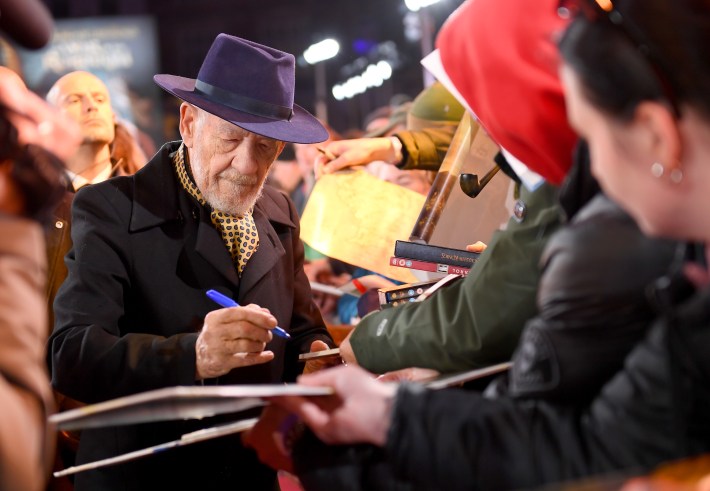
They go on, Maron and McKellen talking about getting older, about holding grudges, about how holding grudges gets harder as you age because you realize how stupid they were. As McKellen notes, "Acting is very easy in comparison to life." It is then that McKellen tells the story of how he came out as gay at age 48.
At the time, in 1988, the British government was considering a bill that would have banned books, films, and art that had gay themes; the justification was that such works promoted homosexuality merely through their existence. McKellen fought against the proposed law, and appeared on a BBC radio show to speak out against it, while also nearing the end of his one-man show Acting Shakespeare. When asked by the host if he would like to see the proposal disappear altogether, McKellen replied, "Oh, yes. I certainly would. Yes. I think it's offensive to anyone who is, like myself, homosexual, apart from the whole business of what can or cannot be taught to children."
It's a beautiful story, one of fear and shame followed by redemption and blossoming. Maron then compels McKellen to tell several more, about being knighted, about making the Lord Of The Rings films—McKellen quips that he would never give up Gandalf because otherwise it might go to Anthony Hopkins; actors are so competitive, they're just like us. It goes on like this, to the point that McKellen says that he has to remember to save something for his memoir. It closes with McKellen, off book, reciting a Shakespearean monologue to Maron about the dangers of attacking the other, in this case immigrants. It's a gorgeous moment, despite McKellen's insistence that theater is best without microphones.
What The Fuckers—this is what Maron calls listeners, along with What The Fuckbuddies and What The Fucknicks and any number of terms of endearment to open each episode—will recall that Maron was so moved that he kept talking about McKellen reciting Shakespeare to him and couldn't help but bring it up to Sir Patrick Stewart when he swung by the garage. Stewart is not impressed. "What a showoff," he replies. Every time I have heard this, my heart skips a beat—aren't Stewart and McKellen friends?!
Stewart then tells the story of his own life. It couldn't be more different than McKellen's, despite their shared traits. Stewart grew up speaking a local dialect, and his father served in battle during World War II; the person who came back from the front was a man prone to violence who beat his wife and terrorized his family. Stewart's interview hinges on his own quest to not be like his father, while also building up his career as a successful Shakespearean actor in his own right, one who would play the monstrous Macbeth and become an activist against intimate-partner violence. But all that gets flipped on its head when, many years later, Stewart learns that his father came back from the war with what was then called "shell shock," which we would now consider PTSD. In that moment, Stewart says that he realized he had to atone for his years of painting his own father in a villain's light. He decided to take up PTSD as a cause as well.
The connection to McKellen comes when Stewart discusses how they finally, after years of parallel career paths, became friends on the set of the X-Men films.
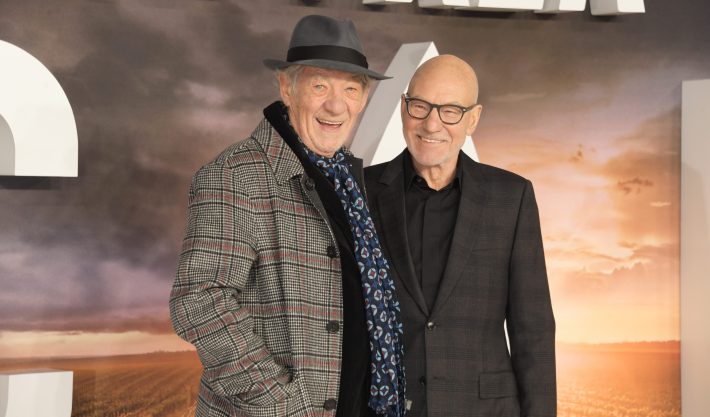
As Stewart explains it, he had avoided McKellen for years, because everyone knew from the moment that McKellen appeared on stage at Cambridge that he was a star. Stewart knew he could't compete with a man so much more talented and better-educated than himself, who never finished school, and so he did his best not to. (In his memoir, Stewart also said that McKellen told him not to take his career-making role in Star Trek.) But as McKellen and Maron said, the hard feelings tend to fall away over time; McKellen and Stewart started hanging out, realized how much they did have in common, and became fast friends. When McKellen agreed to perform Waiting for Godot on Broadway and needed another actor to take the stage with him, he told the director it should be Stewart. Though it's not said overtly, it becomes clear that, after all those decades, whatever inferiority Stewart had to McKellen just fades away, replaced by a recognition that everyone involved was struggling to become and be their true selves all the while.
That is the moment, every time I listen, when I weep. If WTF had its own philosophy of life, it would go more or less like this. You will start out young and filled with righteous anger at how unfair the world is. You will try many things, and you will probably fail at them. But that's OK. Everyone fails, and everyone is hiding shame they believe nobody else will understand. Everyone gets at least a few bad breaks, and some more than a few. But if you hang in there, at some point, you will cease to fail. At some point, you will get a lucky break. At some point, you will look around and realize that while this might not be the life you envisioned, it's still a good life and one you can be proud of. You will fuck up, and you know what you should do after? Fucking apologize. And then at some point after that you will get older and wiser and realize your apprehension about Sir Ian McKellen was ridiculous.
These are two of my favorite pieces of audio. I recommend them to people constantly. To my ear, they also display what made Maron the best, and what made WTF different from any other podcast. He really, regularly got interesting people to go to places they would never go in any other interview. Maron, famously, does very little preparation, a practice I wouldn't recommend for anyone else, but which he can get away with because he's just that good at engaging with people in front of a microphone. This also, strangely enough, sometimes made him an excellent interviewer of women directors and actresses; because he knew none of the gossip, he just talked to them like artists and people.
In the early episodes, Maron's engagement comes from a sort of reckless anger—he's broke, he feels left behind by his peers and damned by the world, and the enterprise has a sort of Fuck you, I'll go there, so why don't you? feeling. The early success of that sheer audacity, though, didn't stop Maron's self-probing. He didn't wall himself off or protect what he gained once he'd finally gotten it. Instead he seemed to discover a genuine passion for connecting with people, and what Maron would later describe as a growing capacity for empathy would first temper and then replace the old piss and vinegar. He tries not to judge—he's got too many years of sobriety in him for that, another frequent topic on the pod—but he does expect honesty, and appreciates guests reciprocating his friendly ribbing. If WTF had a motto, it would be go deep or go home.
Over the coming months, a lot of best-of lists will get trotted out. They'll include his interview with Robin Williams (episode 67, now in the Library of Congress), his confrontation with Carlos Mencia about joke stealing (episodes 75 and 76), Todd Hanson (episode 190), Todd Glass (episode 245), Mandy Moore (episode 995), Maron's late partner Lynn Shelton (episode 627), pretty much every interview with a comedy legend (too many to count at this point), and his two-parter with Louis C.K. (episodes 111 and 112). But for me, the most important episode that hinges on C.K. isn't his interviews. It's episode 863 (Kim Deal), the first episode aired after the New York Times confirmed the longstanding rumor that C.K. had frequently masturbated in front of and around young female comedians. Maron used the introduction before the episode to talk about the report.
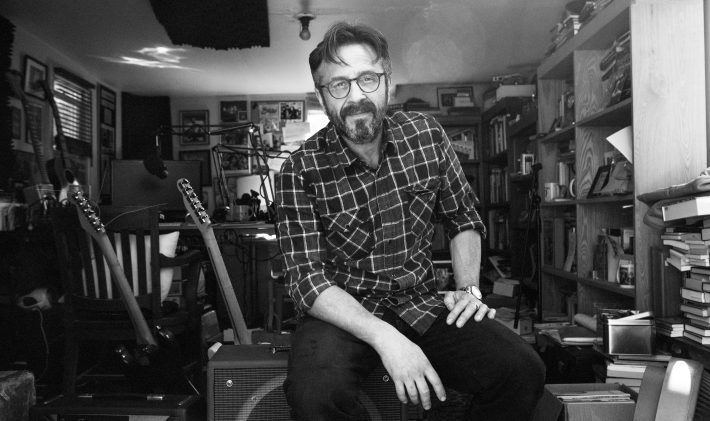
If the McKellen and Stewart interviews showed WTF at its best in connecting with guests, the introduction for this episode showed why the monologues were just as important, and why damn near every other interview podcast would rip off the format. The show's emotional stakes were embedded in those monologues, and included everything from Maron wrangling his cats to grappling with his role in his failed marriages to his ongoing sobriety. In this case, the monologue was a place for Maron to grapple with the reports about C.K., who was a big part of the story WTF told about itself.
After coming up together in comedy, the two grew distant when C.K. got famous and Maron did not. The two-part episode in which Maron and C.K. work through all that had already been declared one of the greatest podcast episodes of all time, and Maron had gone on to play himself on C.K.'s acclaimed FX show. How could people not want to know what Maron had to say about a man to whom he'd been so intimately linked?
In the first episode after the news, Maron launched right into the monologue this time, with barely a hello. He knew why we were there and he knew the question at hand. What did he know? Maron says he had heard a story before about unnamed female comedians in Aspen being forced to watch C.K. jerk off. He says he asked C.K. about it, and C.K. told him that it was just a rumor, and one he would not address publicly because doing so would just give it too much air. Maron says he did not know about the other times this happened, which were reported in the Times article. He believed C.K. because C.K. was his friend. But Maron doesn't end there. He unpacks why he didn't know more—because the entire ecosystem of stand-up comedy made it difficult, if not impossible, for women to come forward and speak up without ending their entire careers:
The work environment, the social environment makes it difficult for people to come forward and be heard, to be listened to, to be believed, and for action to be taken around that. It is pushed aside. It is dismissed. It is framed as an annoyance or an embarrassment. It is used against people. It is used as a threat. That is the structure that exists in life.
So how do we get that power structure in check?
The big step is empathy. Something I have ... I've had problems with. Empathy.
You know, when you have man brain or when you are not capable of empathizing properly with women, which I don't think a lot of men are. And I'm not going to speak for all men, but I can speak for myself. To find that empathy, it requires some sort of vigilance. It requires, you know, really being—not just listening to someone's story or listening to something someone says—to actually put yourself in the place of another person, that requires a little work.
Especially if you're doing it in a work situation, in a situation where there's a power dynamic, in a situation where you're not even seeing a person—you're just seeing a woman who is there to receive your garbage, or to be used as a sexual object, or to be diminished or condescended to, or dismissed, or pushed aside with your own selfish needs and desires.
It's hard to understand that that power dynamic is real and it exists because things have been the way they've been for a long time.
From there, Maron thrashes away at all the flimsy and self-justifying excuses made by men across comedy and every other (male-dominated) field of endeavor. He does not exclude himself from this; he too has been a toxic male presence, Maron allows. His IFC show didn't have a single female writer on it and employed only one female director in its entire run. He says that he has to change his mindset. He has to evolve, yes, even if he's 54. He looks back on the two times he dated fans—marrying one, getting engaged to the other—and admits that there were surely a lot of uncomfortable power dynamics at play that, at the time, he just chose to ignore because "they like me and they get me."
That he can admit to this now and confess to the work he still has to do, Maron says, is because his job of listening to people taught him to empathize, and continues to teach it; he wants to learn, he says, so he can continue to grow. Then he shares a memory of the time he was in college. He really admired this one professor, who took the young Maron out to eat. The first time they had lunch went great. The second time, they went to dinner and the professor forcibly kissed Maron on the mouth. Maron said nothing in response, never reported it, and kept going to class. But he recounts the shame that the experience brought. So, yeah, he says. Men have to change. They have to quit the toxic bullshit. They just have to. "This is obviously a fucking massive, turbulent learning moment for men," he says. "If you choose to take the education."
And then Maron says, clearly emotional, that he will not stop being friends with C.K. "It's probably the best time to be his friend, when he needs to make changes in life," Maron says, holding back tears. "You know, I can learn from it. He can learn from it. I hope."
I don't know Maron personally, so I'll leave it up to him and McDonald to know the full story of his evolution. But the podcast changed after this episode. They did start interviewing more people from different backgrounds and with different experiences. Maron would speak openly for years about why they had to shut down comments on their website, which was because of the vitriol that greeted every single woman they brought on. Later, McDonald would say (episode 1,000) that he was torn about going on with the show after the Times report came out. He tells Maron in the episode, "I just remember thinking, Are we culpable in this?" McDonald says his wife told him to sleep on it, which he did, and the show went on. I agree with that decision, for whatever that's worth, but I appreciated knowing that there were real human thoughts and feelings behind the decision to go on.
People who drop in and out of WTF, or who just listen for the interviews, will often complain about the monologues. And if you're just dropping in, sure, why should you care about Maron's rain gutters (these come up in a lot of episodes that cover two different houses, but more recently there's episode 1,399) or the disappearance of Boomer the cat (episode 320), or his ongoing attempts at having a normal relationship (a continuous theme). But if you have been paying attention, wow, do you care.
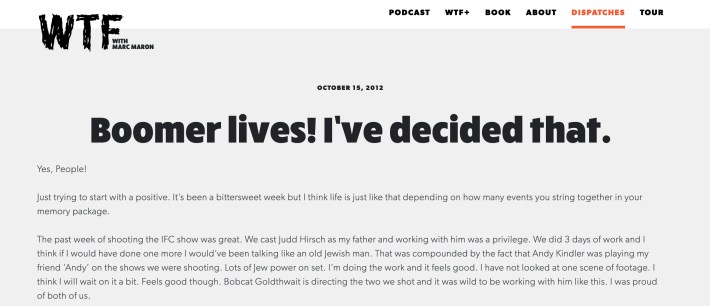
I have always suspected that the trouble casuals and (some) critics have with Maron's monologues is that they don't really fit within the historical confines of masculine literature or podcasting. That sort of raw, unadulterated, brutally honest narrative storytelling about everyday life—you could call it domesticity—has always been the purview of women, from the poetry of Adrienne Rich to the essays of Nora Ephron to the memoirs of Mary Karr. Maron, for his part, is a William S. Burroughs guy, and you can see that influence in his work, but even Burroughs was writing from a lofty perch—an acclaimed literary insider from a wealthy family, with a Harvard degree. That's not Maron, who came to the mic beaten down by life and his own bad decisions.
And that's not the monologues, either. There's too much authentic self-doubt in them for that; early on, it verges on outright self-hatred. He was, when the podcast began, not nearly well enough to swagger like one of the intellectual leaders of the Beat Generation. Never mind that Maron was also broke, which meant that there could be no great adventures. What else could he talk about but his house, his cats, and his struggles with his own inner demons? In a Maron monologue, even now that he has made it into a much more comfortable life, no wars are won, no animals are hunted, no sports team emerges victorious over the other, no corporate boards are taken over, no muscles are built. It is smaller, finer stuff. You could call it domestic writing or, as some men have been known to say privately, girl shit.
A good Maron monologue is filled with the personal darkness of Sylvia Plath, but intercut with the wry cynicism and comedy of Dorothy Parker. His advice to listeners is on par with what Cheryl Strayed did with her Dear Sugar column. Maron's worrying about his weight, his body image, his own health? What female essayist hasn't written about that? Maron telling his fellow men to start being better because a better world for women is a better world for all, which is something he would keep doing long after the C.K. podcast, isn't full-on bell hooks but, hey, we all start somewhere. It is, at any rate, a deep and searching examination and inventory, a life pulled apart string by string then reassembled into something new, perhaps with a little bit more narrative and spice, in search of some greater truths. This is a celebrated tradition in women's writing, but a less-celebrated one in the white male canon. It is certainly not reflective of the currently most popular white men in podcasting, which brings us to another reason why WTF had to end.
For longtime listeners, the end of WTF is not quite a surprise. Concerns about the future of comedy, of podcasting, and the country itself have been seeping into Maron's monologues for a while now. Maron's talked about moving to Canada, to New York City, and to New Mexico, and probably a few other places that I've forgotten. (Maron has also talked about moving to Ireland, but that to me always felt less serious.) After a disastrous episode with Ben Kingsley (episode 1,445)—unlike fellow Shakespeareans McKellen and Stewart, Kingsley showed up having no clue how the show worked and is a jerk through much of the episode—the show started bringing back previous guests and having more comics on again. The emphasis shifted towards guests who would click with Maron and not just the biggest names they could get. There was a drawing back in this, but none of that signaled the outright end.
To my ears, the end began late last year, when Maron interviewed the influencer turned podcaster Bobbi Althoff (episode 1,600). It's a great interview, and a deeply insightful look into the world of being a person who holds the attention of others. But it's bleak, and Maron does nothing to hide that. At this point in the podcast, producer McDonald was also getting on the mic regularly for The Friday Show bonus segment, with cohost Kris Lo Presto. Their discussion of the Althoff interview felt like two people unpacking the future and facing the darkness of what they saw.
More recently, Maron talked to MSNBC host Chris Hayes to talk about his book, The Sirens' Call (episode 1,621). It's another great talk, as Maron would say, but one that delves right into our current information system, and the way in which it exploits, monetizes, and weaponizes our attention spans. Maron has remained on top of this media landscape, but that doesn't mean he likes it. In explaining why they were wrapping up the show on a bonus episode last week, both Maron and McDonald were clear about that.
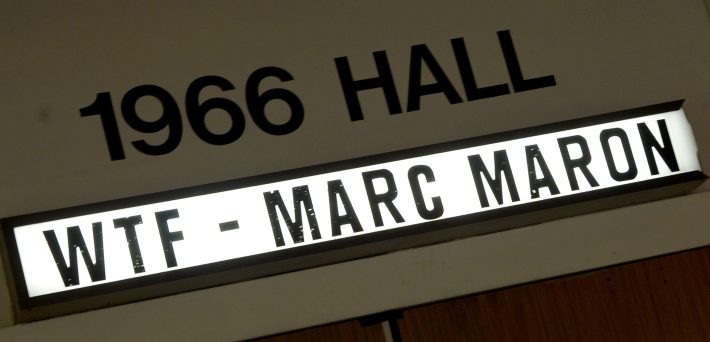
The media landscape is changing, they explained, and they were burned out after posting at least two episodes a week for 16 years. They've interviewed everyone they've ever wanted, they've done so many shows, and as Maron says, at some point, "Who is gonna even listen to all this, and at some point what else can we do?" Why just plug along talking to people they don't want to talk to, Maron asks. "Having a podcast," he continues, "is a punchline now."
They also address the podcast industry's ongoing pivot to video. Through it all, WTF has remained audio only. McDonald says they can get away with audio only because of their clout and success. But, he goes on to say, the industry is changing such that, were it to continue, the show would have do to a lot of things that McDonald and Maron don't want to do: add video, add even more advertisements, use inserted ads as opposed to those Maron reads. Those are not compromises they want to make.
Any fan of podcasts knows that this is true. Once seen as a competitor for radio, video shows (being called podcasts) are now becoming a sort of background TV for our lives—something you throw up on YouTube and play while you work or study or commute, or maybe even while you watch something else on another screen simultaneously. Both Maron and McDonald know what this means. The future of podcasting is both longer and shallower than the present, shows stretching out to fill more time without actually containing more stuff: layers of visuals and cutaways to add interest to what is, still, mostly noise. In an attention economy that has been degraded in this way, there is little place for a long-form, in-depth interview. It's not that they believe WTF to be something precious and holy, but they do believe it is worth listening to more intently than that. They could adapt, but also they don't have to.
The most important relationship embodied on WTF, much more so than Maron and his girlfriends, has been Maron and McDonald. Each, when asked, has always said they'll do it as long as the other guy wants to. They're open about always being 50-50 on the show. They've never sold it. They never used it to build out their own podcast network. It was always, even after Obama came on the show, a little punk rock, or at least as punk as you could be while giving out promo codes for Stamps.com, JustCoffee.coop, Squarespace, and Adam and Eve. Even as the show grew and they added outside help with bookings and the like, it was, in rock 'n roll parlance, always Maron and McDonald's band. In the crass world of intellectual property, stories are now forced to go on forever, or for as long as there's money to be wrung from them. Punk lives on a different, shorter timetable. Bands end; that's part of what makes them so special. Everyone knows this, and so everyone knows that you have to enjoy them while they last. If it can end without the bandmates hating each other, it's a miracle. Maron and McDonald and WTF seem headed for that kind of happy ending.

On an episode whose number I actually cannot recall, McDonald once said something to the effect of he always thought of WTF as the Marc Maron Audio Diaries. Near of the end of their most recent conversation, McDonald points out that Maron has achieved pretty much everything he wanted to do when the podcast started. Acting? Check. Your own TV show? Check. Interviewing Lorne Michaels and Keith Richards (twice!) and Obama and some of comedy's biggest (and most interview-averse) legends, including Albert Brooks and Carol Burnett? Check. HBO special? Check. A documentary about him premiered at Tribeca. Maron's even expected to direct soon. Hearing McDonald talk to Maron about this, you can hear his producer brain signaling that we are now in the third act of the Maron Audio Diaries. The conflicts have been resolved. The goals have been achieved. It is just about time to wrap this up and get the audience home.
It wasn't quite a hero's journey. The story being told over these 16 years was about one man's journey to get his damn life together and figure out his shit. Maron did that, and he can just be Marc Maron now—do his comedy, do his acting, send his friends some cash if they need it. If there were a tao of Brendan McDonald, it would be the closing line of the episode: "That's actually life. That's how it should work. You're like, I've had success, it's moved me along to a point of happiness, and I can now think about other people. That's great!"
The future for WTF will be heavy on awards and celebrations, pieces like this one looking back on the show as a text and profiles and interviews celebrating Maron as a hero. There will be so many best-of lists.
For longtime What The Fuckers, there will also be a chance to look back and take stock of our own lives. Where were we when this started, and where are we now? When WTF launched, I was working at the Miami Herald, a little less than six months after the newspaper had almost laid me off as part of company-wide reduction in workforce. The only reason I got to keep my job was because another reporter in my cohort took a buyout; his wife was going to medical school outside of the state, he was moving anyway. It was just dumb luck. A much older and wiser and incredibly accomplished investigative journalist got laid off in that round, entirely because he happened to get hired at a later date than me. At his going-away party, he told me not to feel bad. I should stay, he said. I deserved to stay. He was right. I had horrible survivor's guilt anyway.
Over time, I grew to wish I had been laid off. There were furloughs, so many furloughs. Sometime after surviving the layoffs, after I started listening to WTF, I got moved downtown to work the night shift. Over time, it became clear the Herald was never moving me off that assignment. I listened to WTF during my commute, and while I applied for other jobs. No one else in journalism wanted to hire me. I was burned out, I was tired, I felt like my career had been a waste. I did not have much money in my bank account. I eventually quit and drove with my boyfriend across the country to Los Angeles to try to do something, anything, new with my life. I had one of my cats in the car with me (the other cat rode with him in his) and caught up on WTF episodes along the way.
The boyfriend is now my husband, and he swears WTF is the reason we're married. When we were dating long-distance, we would listen to each new episode and talk about it that night. While giving WTF all the credit might be a bit much, he has a point. WTF got me, and us, through a lot. I listened to it while we learned to live together, and after we got married, and as I grew up and my elders passed away, and while I wrote my first sports stories for some flannel-wearing guy at a place called The Classical, and while I worked at NFL Media, and while I spent a year writing sketch comedy at UCB, and when I cold-emailed a popular sports blog that had been called out for having no women on its full-time staff and suggested that they should hire me, which they did. I never stopped listening to it. This is something like my whole adult life.
Like Maron finally getting his HBO comedy special, I finally achieved my lifelong dream of selling a nonfiction book. If I know a long-distance car ride is coming up, I'll stock up on episodes and listen to them with my husband; we still talk about them afterward. I don't have "I can walk away from it all" money, but I am in a better place. It's been a journey, but this is a good life.
Like Maron, I have different cats from when WTF started. This is just the way the world works, and what time does. Real What The Fuckers know Boomer lives, so do Monkey and LaFonda, (as do my girls, Katharine Graham and Lilly), and cat angels really are everywhere. We know that things change.
If you enjoyed this blog, please support Defector so we can keep doing blogs like it! Click here to subscribe, click here to make a one-time contribution, or click here to sign up for our free newsletter that'll bring you more blogs like this.






